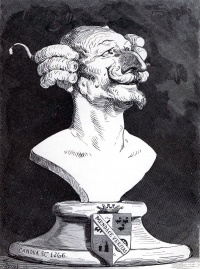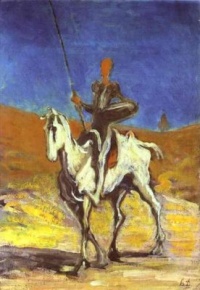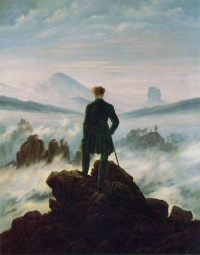Adventure
From The Art and Popular Culture Encyclopedia

|
"If a man is not ready to risk his life, where is his dignity?"--La Condition Humaine (1933) by André Malraux "I am not the narrator but only the editor of this extraordinary history."--She: A History of Adventure (1887) by H. Rider Haggard |


_-_Hendrick_Goltzius.jpg)
|
Related e |
|
Featured: |
An adventure is an exciting experience that is typically bold, sometimes risky or undertaking. Adventures may be activities with some potential for physical danger such as traveling, exploring, skydiving, mountain climbing, scuba diving, river rafting or participating in extreme sports. Adventures are often undertaken to create psychological arousal or in order to achieve a greater goal such as the pursuit of knowledge that can only be obtained in a risky manner.
Contents |
Etymology
From Middle English aventure, aunter, anter, from Old French aventure, from Late Latin adventurus, from Latin advenire, adventum (“to arrive”), which in the Romance languages took the sense of "to happen, befall" (see also advene).
Motivation
Adventurous experiences create psychological arousal, which can be interpreted as negative (e.g. fear) or positive (e.g. flow). For some people, adventures becomes a major pursuit in and of itself. According to adventurer André Malraux, in his La Condition Humaine (1933), "If a man is not ready to risk his life, where is his dignity?". Similarly, Helen Keller stated that "Life is either a daring adventure or nothing."
Outdoor adventurous activities are typically undertaken for the purposes of recreation or excitement: examples are adventure racing and adventure tourism. Adventurous activities can also lead to gains in knowledge, such as those undertaken by explorers and pioneers – the British adventurer Jason Lewis, for example, uses adventures to draw global sustainability lessons from living within finite environmental constraints on expeditions to share with schoolchildren. Adventure education intentionally uses challenging experiences for learning.
Author Jon Levy suggests that an experience should meet several criteria to be considered an adventure:
- Be remarkable—that is, worth talking about
- Involve adversity or perceived risk
- Bring about personal growth
Mythology and fiction
Some of the oldest and most widespread stories in the world are stories of adventure such as Homer's The Odyssey.
The knight errant was the form the "adventure seeker" character took in the late Middle Ages.
The adventure novel exhibits these "protagonist on adventurous journey" characteristics as do many popular feature films, such as Star Wars and Raiders of the Lost Ark.
Outdoors
Adventure books may have the theme of the hero or main character going to face the wilderness or Mother Nature. Examples include books such as Hatchet or My Side of the Mountain. These books are less about "questing", such as in mythology or other adventure novels, but more about surviving on their own, living off the land, gaining new experiences, and becoming closer to the natural world.
Questing
Many adventures are based on the idea of a quest: the hero goes off in pursuit of a reward, whether it be a skill, prize, treasure or perhaps the safety of a person. On the way, the hero must overcome various obstacles to obtain it's reward.
Video games
In video-game culture, an adventure game is a video game in which the player assumes the role of a protagonist in an interactive story driven by exploration and puzzle-solving. The genre's focus on story allows it to draw heavily from other narrative-based media, literature and film, encompassing a wide variety of literary genres. Many adventure games (text and graphic) are designed for a single player, since this emphasis on story and character makes multi-player design difficult.
Nonfiction works
From ancient times, travelers and explorers have written about their adventures. Journals which became best-sellers in their day were written, such as Marco Polo's journal The Travels of Marco Polo or Mark Twain's Roughing It. Others were personal journals, only later published, such as the journals of Lewis and Clark or Captain James Cook's journals. There are also books written by those not directly a part of the adventure in question, such as The Right Stuff by Tom Wolfe, or books written by those participating in the adventure but in a format other than that of a journal, such as Conquistadors of the Useless by Lionel Terray. Documentaries often use the theme of adventure as well.
Adventure sports
There are many sports classified as adventure games or sports, due to their inherent danger and excitement. Some of these include mountain climbing, skydiving, or other extreme sports.
Adventure fiction
Adventure fiction has been a common theme since the earliest days of written fiction. Indeed, the standard plot of Medieval romances was a series of adventures. Following a plot framework as old as Heliodorus, and so durable as to be still alive in Hollywood movies, a hero would undergo a first set of adventures before he met his lady. A separation would follow, with a second set of adventures leading to a final reunion.
Variations kept the genre alive. From the mid-19th century onwards, when mass literacy grew, adventure became a popular subgenre of fiction. Although not exploited to its fullest, adventure has seen many changes over the years – from being constrained to stories of knights in armor to stories of high-tech espionages.
Examples of that period include Sir Walter Scott, Alexandre Dumas, père, Jules Verne, Brontë Sisters, H. Rider Haggard, Victor Hugo, Emilio Salgari, Louis Henri Boussenard, Thomas Mayne Reid, Sax Rohmer, Edgar Wallace, and Robert Louis Stevenson.
Adventure novels and short stories were popular subjects for American pulp magazines, which dominated American popular fiction between the Progressive Era and the 1950s. Several pulp magazines such as Adventure, Argosy, Blue Book, Top-Notch, and Short Stories specialized in this genre. Notable pulp adventure writers included Edgar Rice Burroughs, Talbot Mundy, Theodore Roscoe, Johnston McCulley, Arthur O. Friel, Harold Lamb, Carl Jacobi, George F. Worts, Georges Surdez, H. Bedford-Jones, and J. Allan Dunn.
Adventure fiction often overlaps with other genres, notably war novels, crime novels, sea stories, Robinsonades, spy stories (as in the works of John Buchan, Eric Ambler and Ian Fleming), science fiction, fantasy, (Robert E. Howard and J. R. R. Tolkien both combined the secondary world story with the adventure novel) and Westerns. Not all books within these genres are adventures. Adventure fiction takes the setting and premise of these other genres, but the fast-paced plot of an adventure focuses on the actions of the hero within the setting. With a few notable exceptions (such as Baroness Orczy, Leigh Brackett and Marion Zimmer Bradley) adventure fiction as a genre has been largely dominated by male writers, though female writers are now becoming common.
Adventure film
Adventure film popularity peaked in the 1930s and 1940s, when films such as Captain Blood, The Adventures of Robin Hood, and The Mark of Zorro were regularly made with major stars, notably Errol Flynn and Tyrone Power, who were closely associated with the genre. Saturday morning serials used many of the same thematic elements as high-budget adventure films.
In the early days of adventure films, the characters were mainly male. These heroes were courageous, often fighting suppression and facing tyrants. Recent adventure films have featured heroines, such as Lara Croft, as protagonists.
See also
- L'avventura
- List of genres
- Exploration
- Tourism
- Travel
- Sports
- Adventure fiction
- Adventure film
- Men's adventure


